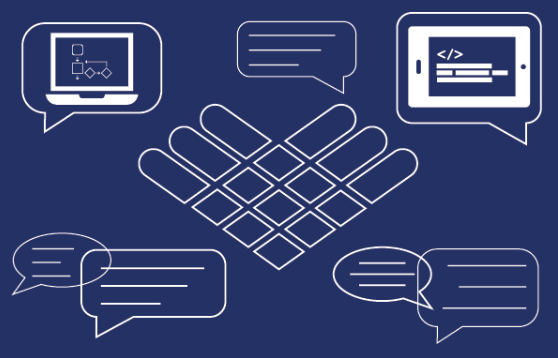In December 2022, the Engage AI Institute hosted a day-long forum in Silicon Valley called “Envisioning Advanced, Human-Centered AI for Teaching and Learning.” A mixed group of 70 researchers, educators, industry, and funders spent the day intensively discussing artificial intelligence (AI) and education. What emerged as unique about this event was the degree to which participants were willing to reflect on their own work and their own needs for change. In their stories, we saw hope for an approach to AI in education that would be rooted in partnerships and greater accountability to a shared educational vision.
Researchers: We Need to Build a Common Language
Leading off the event, a panel of researchers from major national research centers considered the changes in their own work that would be necessary to create AI with positive impacts in education. Questions raised included: “Why is it hard for research teams to meaningfully address equity and ethics as they develop AI for education?”
Dr. Nonye Alozie, from SRI International, shared that in engineering or content development, teams have a lot of knowledge of how to bring theoretical knowledge into their practice. Regarding equity, they are familiar with terms like “Diversity, Equity and Inclusion” but don’t dig deeply enough into the scholarship to determine what it would mean to deeply incorporate equity into their research with AI in education.
Elaborating on this point,Dr. Dora Demsky, from Stanford University explained that “there’s no shared vocabulary or language to guide discussions about equity and ethics.”
Dr. James Lester, from North Carolina State University, argued that building bridges among developer, researcher, and practitioner perspectives could not wait for the end stages of a research project. Today we are seeing that the release of AI tools like ChatGPT results in fearful responses from educators; in contrast, researchers at this workshop were intentionally thinking about how AI researchers could contribute to trust. All the panelists indicated their excitement in being at an event where they could spend a whole day talking about these issues with industry and practitioners.
Educators: Using Technology Well Takes Time and Care
In the practitioner panel, long-time Spanish teacher Jesús Ramos, from Sacred Heart Preparatory, provided insight into how he has worked over the years to incorporate a range of advanced technologies into his work, sharing the mindset of a reflective practitioner. Ramos reminded the audience that when he plans curriculum, he begins with the end goal in mind and uses that to guide his lessons and planning for the unit, semester, or school year.
“When I think of AI integration in the classroom, I think ‘how can AI partner with teachers in the process of curriculum design?’”
– Jesus Ramos, Sacred Heart Prep
He shared that he would welcome the support of an AI system so that he can better individualize instruction for students and also give them relevant and actionable feedback on their work. This would require the AI system to partner with him, not do things for him. Incorporating technology is never a quick fix, but always a process that Ramos works on, to improve his practice.
Carly Chillmon, Senior Research Communications Manager at Digital Promise, represented family and parent groups in the practitioner panel, where she reminded the audience to include families in the design of AI systems from the beginning. Alongside Kip Glazer, Principal of Mountain View High School, the group agreed that communication from schools about emerging technologies must be transparent and consistent to families.
Glazer highlighted how she ensures that the AI systems she integrates at her school are not perpetuating systemic biases and harming her students or their families. She also raised core educational questions: what counts as learning, what does progress look like, how is student progress measured by these AI systems, and how are adults in the loop as AI supports student learning?
Developers: We Need to be Accountable
Developers shared excitement about how analyzing big data could help teachers and how generative AI could create new experiences for students. They also shared the hard work required to take an AI-based educational product to scale. Thus, the panel continued the reflective tone of the meeting, with industry panelists showing a willingness to take a critical look at their own roles.
“When I delete an app it’s because it didn’t work for me, but if teachers are opposed to technologies we often blame them. We need to look in the mirror and think about how we can better adapt our practices.”
– Laura Glaab, Amira Learning
When developers come to the table, they’re often excited about the work they’ll get to do. However, the excitement often blocks their ability to dig deeper and look beyond superficial risks to deeper concerns with emerging technologies. Overall the panelists outlined new ways in which their work could be accountable to teachers, to the shared goal of equity, and to research.
Conclusion: A Nexus for Deeper, Sustained Conversations about AI in Education
The post-convening survey, conducted by Digital Promise, provided us with a deeper look into the thoughts of our community members. We learned:
- All participants found strong value in participating in the reflective, conversational space of the Forum, especially the opportunities to talk with people in different roles and varied professional backgrounds.
- Interactive elements of the program were very engaging, with participants filling post-it boards with notes.
- The in-person format allowed participants to feel less fearful and have deeper quality conversations, compared to webinars or on social media.
With our Nexus, part of the Engage AI Institute, we are committed to creating spaces for long-term interactions across perspectives; for conversations among people who are willing to look at how their own practices need to change; for interactive discussions that unite critical perspectives on equity and ethics with an orientation to making positive changes going forward.

